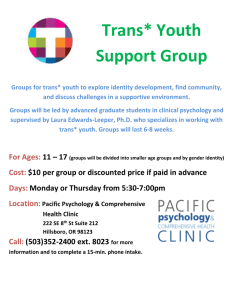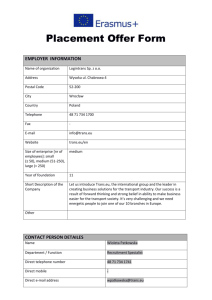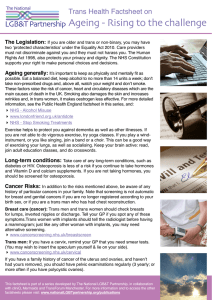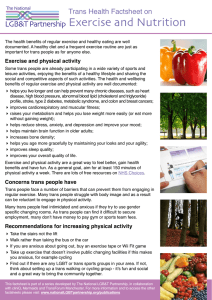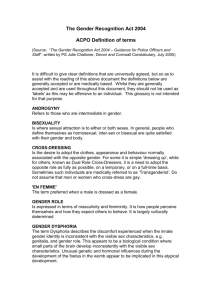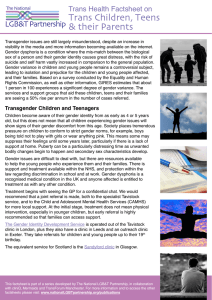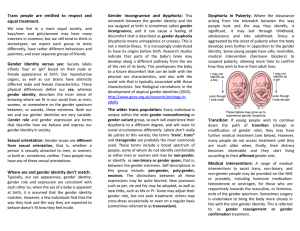Mental Health & Wellbeing LGB&T Partnership Trans Health Factsheet on Introduction
advertisement
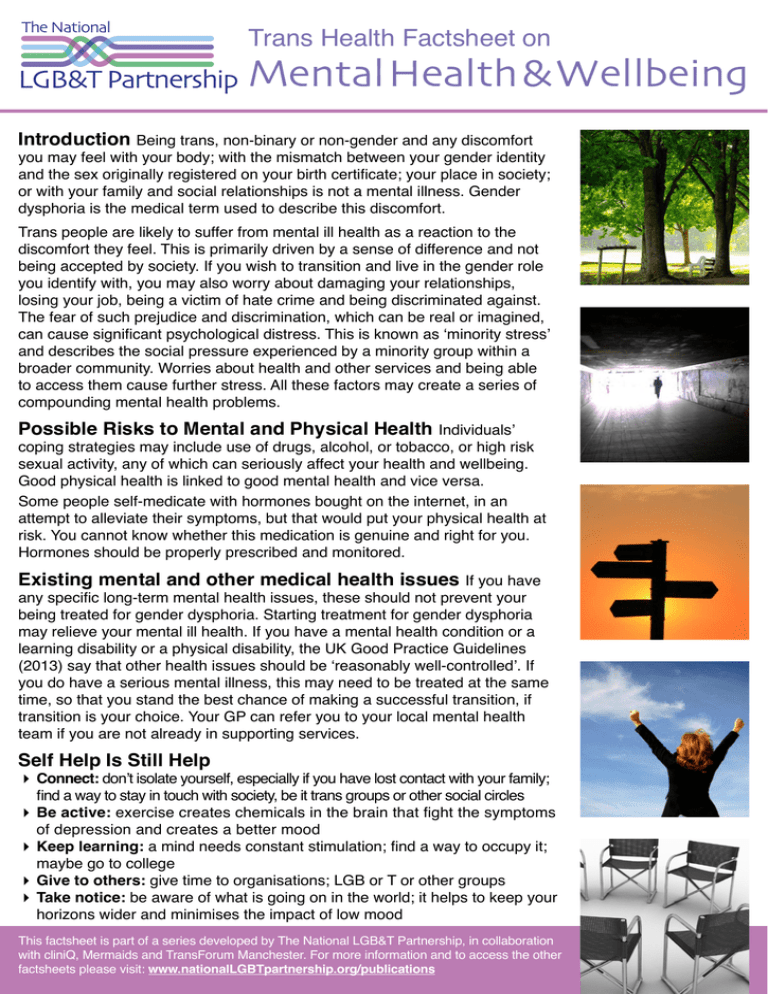
The National LGB&T Partnership Trans Health Factsheet on Mental Health & Wellbeing Introduction Being trans, non-binary or non-gender and any discomfort you may feel with your body; with the mismatch between your gender identity and the sex originally registered on your birth certificate; your place in society; or with your family and social relationships is not a mental illness. Gender dysphoria is the medical term used to describe this discomfort. Trans people are likely to suffer from mental ill health as a reaction to the discomfort they feel. This is primarily driven by a sense of difference and not being accepted by society. If you wish to transition and live in the gender role you identify with, you may also worry about damaging your relationships, losing your job, being a victim of hate crime and being discriminated against. The fear of such prejudice and discrimination, which can be real or imagined, can cause significant psychological distress. This is known as ‘minority stress’ and describes the social pressure experienced by a minority group within a broader community. Worries about health and other services and being able to access them cause further stress. All these factors may create a series of compounding mental health problems. Possible Risks to Mental and Physical Health Individuals’ coping strategies may include use of drugs, alcohol, or tobacco, or high risk sexual activity, any of which can seriously affect your health and wellbeing. Good physical health is linked to good mental health and vice versa. Some people self-medicate with hormones bought on the internet, in an attempt to alleviate their symptoms, but that would put your physical health at risk. You cannot know whether this medication is genuine and right for you. Hormones should be properly prescribed and monitored. Existing mental and other medical health issues If you have any specific long-term mental health issues, these should not prevent your being treated for gender dysphoria. Starting treatment for gender dysphoria may relieve your mental ill health. If you have a mental health condition or a learning disability or a physical disability, the UK Good Practice Guidelines (2013) say that other health issues should be ‘reasonably well-controlled’. If you do have a serious mental illness, this may need to be treated at the same time, so that you stand the best chance of making a successful transition, if transition is your choice. Your GP can refer you to your local mental health team if you are not already in supporting services. Self Help Is Still Help Connect: don’t isolate yourself, especially if you have lost contact with your family; find a way to stay in touch with society, be it trans groups or other social circles Be active: exercise creates chemicals in the brain that fight the symptoms of depression and creates a better mood Keep learning: a mind needs constant stimulation; find a way to occupy it; maybe go to college Give to others: give time to organisations; LGB or T or other groups Take notice: be aware of what is going on in the world; it helps to keep your horizons wider and minimises the impact of low mood This factsheet is part of a series developed by The National LGB&T Partnership, in collaboration with cliniQ, Mermaids and TransForum Manchester. For more information and to access the other factsheets please visit: www.nationalLGBTpartnership.org/publications Trans Health Factsheet on Mental Health & Wellbeing Other Tips Look after your general health - Eat sensibly and regularly - At least 5 portions of fruit and veg a day: www.nhs.uk/5ADAY Learn about ‘mindfulness’ to help you cope with times when you feel particularly down: www.nhs.uk/conditions/stress-anxiety-depression/pages/mindfulness.aspx www.tranzwiki.net is a directory of support groups arranged geographically so you should be able to find one near you. Trans events such as Sparkle and Trans Pride Brighton, or an LGBT event such as Pride, provide opportunities to meet other trans people The National Trans Youth Network will be especially helpful to trans people under 25 www.lgbtconsortium.org.uk/directory/national-trans-youth-network If you have a partner, you may both benefit from counselling, separately and/or together. There is specialist help available regarding any existing or new sexual relationships: www.cliniq.org.uk. Don’t be afraid to ask your GP to refer you for help; an e-learning resource specifically for GPs is at: www.elearning.rcgp.org.uk/gendervariance (from early 2015) If you have school age children, you may worry that they will be bullied, so you could link the school with groups that can help to educate schools. www.allsortsyouth.org.uk; www.mermaidsuk.org.uk; www.gires.org.uk Some leisure centres have trans-friendly arrangements. www.nhs.uk/conditions/stress-anxiety-depression/pages/mental-benefits-of-exercise.aspx Other information and support The other factsheets in this series provide signposts to help with specific issues. Also, the following organisations are skilled in supporting people who experience poor mental health: www.samaritans.org/branches (find nearest branch) www.mind.org.uk/information-support/guides-to-support-and-services/sexuality-and-mental-health www.rethink.org www.nhs.uk/Livewell/Transhealth/Pages/Transmentalhealth.aspx The good news Despite the difficulties, you should be optimistic about your future. There is now better equality and human rights legislation which protects your privacy and dignity, especially regarding your right to live according to your gender identity. Many families do remain supportive; employers do know that discriminatory practices are against the law, and should have policies in place to help you; and media coverage is more favourable. Over 200 groups do provide support. These factors all contribute to making a better world for trans and non-binary people. So, if you are still living in great discomfort because you haven’t made changes to bring your gender expression in line with your gender identity, be reassured that life can be better when you transition. “My self-esteem was extremely low before discovering I was trans, and transitioning. Now I am very content and satisfied with myself.” “Being able to be me makes me happy.” Focus on a brighter future. The National LGB&T Partnership This factsheet is part of a series developed by The National LGB&T Partnership, in collaboration with cliniQ, Mermaids and TransForum Manchester. For more information and to access the other factsheets please visit: www.nationalLGBTpartnership.org/publications
